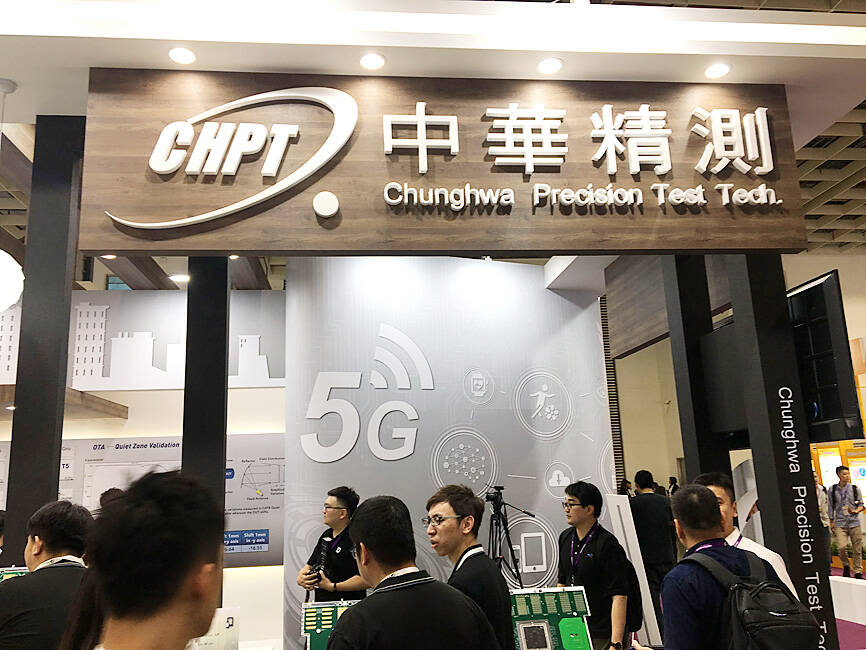Chunghwa Precision Test Technology Co (CHPT, 中華精測) has formed a strategic collaboration with US-based Cohu Inc to deliver advanced probe card and interface products, the company said yesterday, as it aims to build a greater presence in the millimeter-wave 5G radio-frequency chip and automotive advanced driver-assistance systems (ADAS) sensor markets.
Cohu is a global supplier of equipment and services optimizing semiconductor manufacturing yield and productivity, the companies said in a statement.
The cooperation came as 5G chips and ADAS sensors are becoming smaller and creating significant challenges for testing companies, as instrumentation and interface become much more complex, they said.

Photo: CNA
“The rapid adoption of 5G and advanced node technologies are increasing the need for simplified, cost-efficient solutions at the high end of the performance spectrum,” Cohu president and chief executive officer Luis Muller said in the statement.
The combination of CHPT’s and Cohu’s technologies would create an optimized turnkey interface solution for probe and final testing, lowering customers’ costs and improving time to market, the companies said.
Their combined engineering and manufacturing resources would enable scale manufacturing of multisite interface products with test speed performance greater than 60 gigahertz, they added.
The companies intend to collaborate on expanding high-performance interface solutions for final testing, and semiconductor probe cards for wafer test, delivering complete solutions to customers in Taiwan and around the globe, the statement said.
The global semiconductor probe card market is to expand at a compound annual growth rate of 6 percent to US$3.66 billion from last year to 2027, CHPT said, citing a third-party forecast.
The probe card business contributed about 24 percent to CHPT’s revenue last quarter, it added.

GROWING OWINGS: While Luxembourg and China swapped the top three spots, the US continued to be the largest exposure for Taiwan for the 41st consecutive quarter The US remained the largest debtor nation to Taiwan’s banking sector for the 41st consecutive quarter at the end of September, after local banks’ exposure to the US market rose more than 2 percent from three months earlier, the central bank said. Exposure to the US increased to US$198.896 billion, up US$4.026 billion, or 2.07 percent, from US$194.87 billion in the previous quarter, data released by the central bank showed on Friday. Of the increase, about US$1.4 billion came from banks’ investments in securitized products and interbank loans in the US, while another US$2.6 billion stemmed from trust assets, including mutual funds,

AI TALENT: No financial details were released about the deal, in which top Groq executives, including its CEO, would join Nvidia to help advance the technology Nvidia Corp has agreed to a licensing deal with artificial intelligence (AI) start-up Groq, furthering its investments in companies connected to the AI boom and gaining the right to add a new type of technology to its products. The world’s largest publicly traded company has paid for the right to use Groq’s technology and is to integrate its chip design into future products. Some of the start-up’s executives are leaving to join Nvidia to help with that effort, the companies said. Groq would continue as an independent company with a new chief executive, it said on Wednesday in a post on its Web

JOINT EFFORTS: MediaTek would partner with Denso to develop custom chips to support the car-part specialist company’s driver-assist systems in an expanding market MediaTek Inc (聯發科), the world’s largest mobile phone chip designer, yesterday said it is working closely with Japan’s Denso Corp to build a custom automotive system-on-chip (SoC) solution tailored for advanced driver-assistance systems and cockpit systems, adding another customer to its new application-specific IC (ASIC) business. This effort merges Denso’s automotive-grade safety expertise and deep vehicle integration with MediaTek’s technologies cultivated through the development of Media- Tek’s Dimensity AX, leveraging efficient, high-performance SoCs and artificial intelligence (AI) capabilities to offer a scalable, production-ready platform for next-generation driver assistance, the company said in a statement yesterday. “Through this collaboration, we are bringing two

Even as the US is embarked on a bitter rivalry with China over the deployment of artificial intelligence (AI), Chinese technology is quietly making inroads into the US market. Despite considerable geopolitical tensions, Chinese open-source AI models are winning over a growing number of programmers and companies in the US. These are different from the closed generative AI models that have become household names — ChatGPT-maker OpenAI or Google’s Gemini — whose inner workings are fiercely protected. In contrast, “open” models offered by many Chinese rivals, from Alibaba (阿里巴巴) to DeepSeek (深度求索), allow programmers to customize parts of the software to suit their